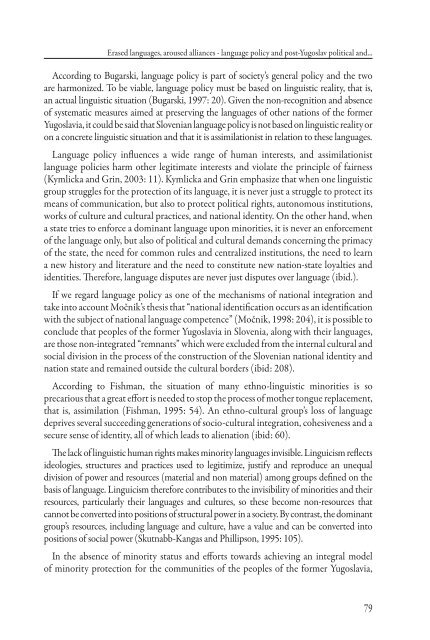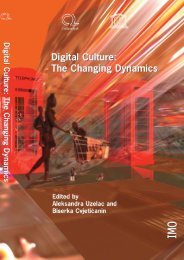free download in pdf format - Culturelink Network
free download in pdf format - Culturelink Network
free download in pdf format - Culturelink Network
Create successful ePaper yourself
Turn your PDF publications into a flip-book with our unique Google optimized e-Paper software.
Erased languages, aroused alliances - language policy and post-Yugoslav political and...<br />
Accord<strong>in</strong>g to Bugarski, language policy is part of society’s general policy and the two<br />
are harmonized. To be viable, language policy must be based on l<strong>in</strong>guistic reality, that is,<br />
an actual l<strong>in</strong>guistic situation (Bugarski, 1997: 20). Given the non-recognition and absence<br />
of systematic measures aimed at preserv<strong>in</strong>g the languages of other nations of the former<br />
Yugoslavia, it could be said that Slovenian language policy is not based on l<strong>in</strong>guistic reality or<br />
on a concrete l<strong>in</strong>guistic situation and that it is assimilationist <strong>in</strong> relation to these languages.<br />
Language policy <strong>in</strong>fl uences a wide range of human <strong>in</strong>terests, and assimilationist<br />
language policies harm other legitimate <strong>in</strong>terests and violate the pr<strong>in</strong>ciple of fairness<br />
(Kymlicka and Gr<strong>in</strong>, 2003: 11). Kymlicka and Gr<strong>in</strong> emphasize that when one l<strong>in</strong>guistic<br />
group struggles for the protection of its language, it is never just a struggle to protect its<br />
means of communication, but also to protect political rights, autonomous <strong>in</strong>stitutions,<br />
works of culture and cultural practices, and national identity. On the other hand, when<br />
a state tries to enforce a dom<strong>in</strong>ant language upon m<strong>in</strong>orities, it is never an enforcement<br />
of the language only, but also of political and cultural demands concern<strong>in</strong>g the primacy<br />
of the state, the need for common rules and centralized <strong>in</strong>stitutions, the need to learn<br />
a new history and literature and the need to constitute new nation-state loyalties and<br />
identities. Th erefore, language disputes are never just disputes over language (ibid.).<br />
If we regard language policy as one of the mechanisms of national <strong>in</strong>tegration and<br />
take <strong>in</strong>to account Močnik’s thesis that “national identifi cation occurs as an identifi cation<br />
with the subject of national language competence” (Močnik, 1998: 204), it is possible to<br />
conclude that peoples of the former Yugoslavia <strong>in</strong> Slovenia, along with their languages,<br />
are those non-<strong>in</strong>tegrated “remnants” which were excluded from the <strong>in</strong>ternal cultural and<br />
social division <strong>in</strong> the process of the construction of the Slovenian national identity and<br />
nation state and rema<strong>in</strong>ed outside the cultural borders (ibid: 208).<br />
Accord<strong>in</strong>g to Fishman, the situation of many ethno-l<strong>in</strong>guistic m<strong>in</strong>orities is so<br />
precarious that a great eff ort is needed to stop the process of mother tongue replacement,<br />
that is, assimilation (Fishman, 1995: 54). An ethno-cultural group’s loss of language<br />
deprives several succeed<strong>in</strong>g generations of socio-cultural <strong>in</strong>tegration, cohesiveness and a<br />
secure sense of identity, all of which leads to alienation (ibid: 60).<br />
Th e lack of l<strong>in</strong>guistic human rights makes m<strong>in</strong>ority languages <strong>in</strong>visible. L<strong>in</strong>guicism refl ects<br />
ideologies, structures and practices used to legitimize, justify and reproduce an unequal<br />
division of power and resources (material and non material) among groups defi ned on the<br />
basis of language. L<strong>in</strong>guicism therefore contributes to the <strong>in</strong>visibility of m<strong>in</strong>orities and their<br />
resources, particularly their languages and cultures, so these become non-resources that<br />
cannot be converted <strong>in</strong>to positions of structural power <strong>in</strong> a society. By contrast, the dom<strong>in</strong>ant<br />
group’s resources, <strong>in</strong>clud<strong>in</strong>g language and culture, have a value and can be converted <strong>in</strong>to<br />
positions of social power (Skutnabb-Kangas and Phillipson, 1995: 105).<br />
In the absence of m<strong>in</strong>ority status and eff orts towards achiev<strong>in</strong>g an <strong>in</strong>tegral model<br />
of m<strong>in</strong>ority protection for the communities of the peoples of the former Yugoslavia,<br />
79



